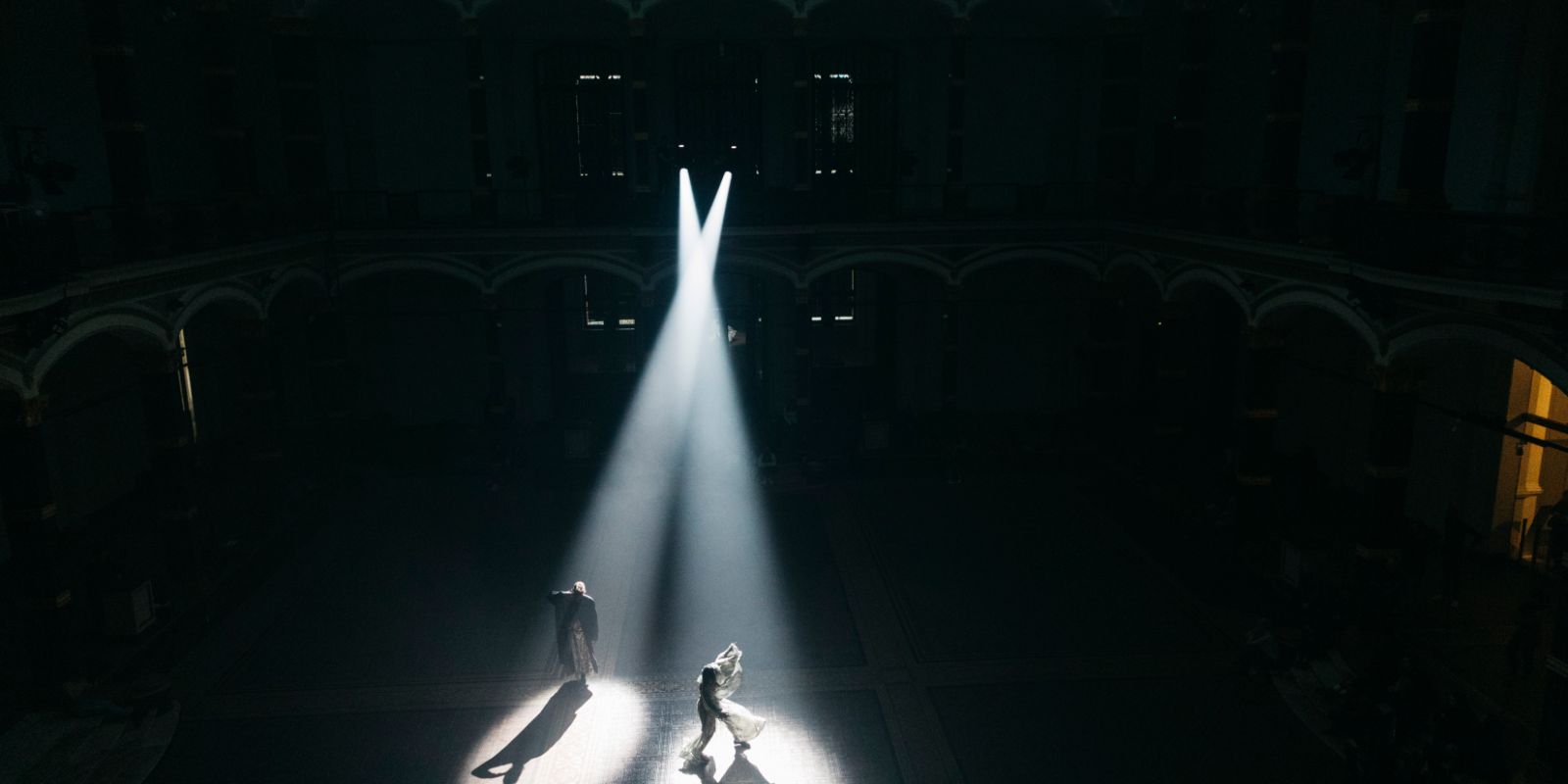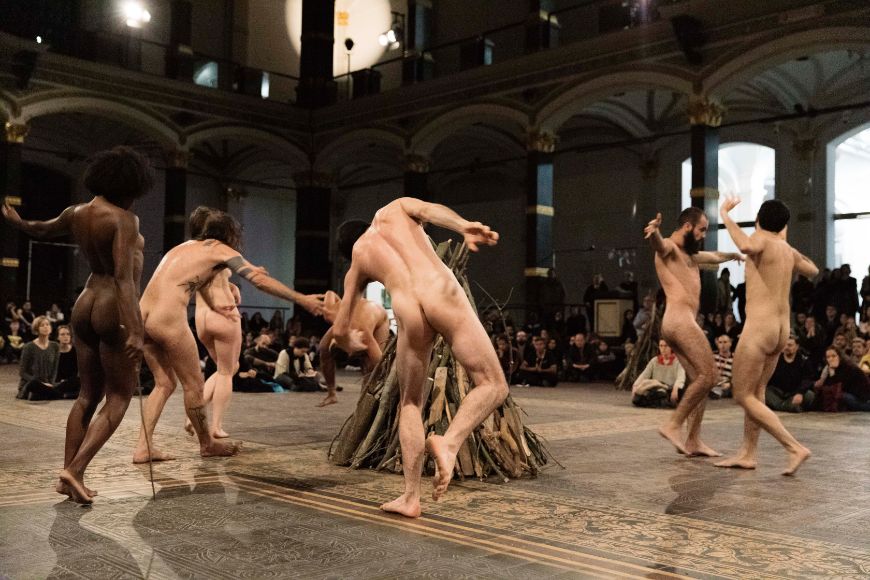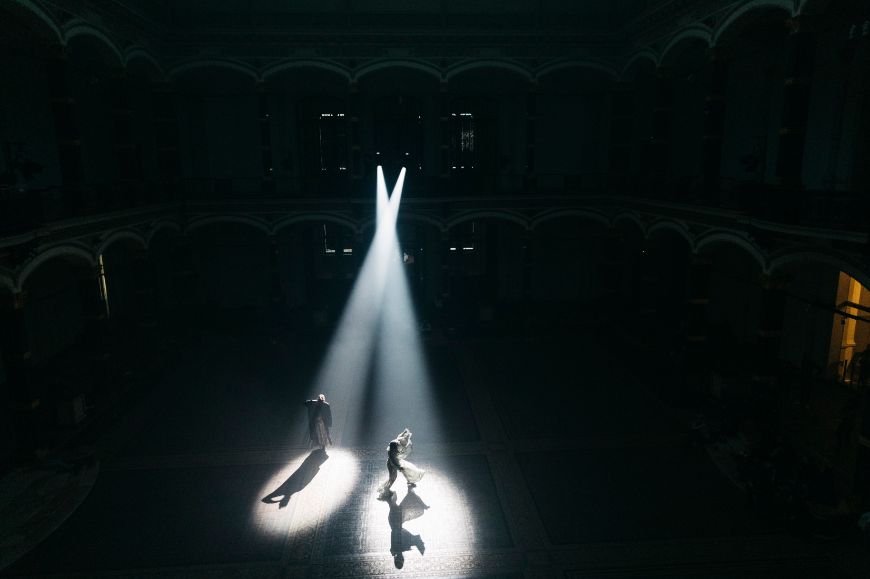Text | Essay | Gropius Bau 2022
Extemporary Rituals: Notes on the Dances of Marcelo Evelin and Tosh Basco
By Noémie Solomon

Connecting ancient rites to dissident futures, dance can disrupt the rigid orders of time, history and post-colonial “progress“. Noémie Solomon explores the work of Tosh Basco and Marcelo Evelin, who make “rituals for an entangled world“.
Incorporating ritual forms, experimental sonic terrains and temporal shifts, the fugitive choreographies of Tosh Basco and Marcelo Evelin offer glimpses into how ruptures can be created in the orderly march of post-colonial history and the violence of modern thought. Writer and curator Noémie Solomon focuses on Tosh Basco’s Untitled Duet (the storm called progress) and Marcelo Evelin’s A Invenção da Maldade(The Invention of Evilness) – two works performed as part of the Gropius Bau’s Rituals of Care programme – to look at dance’s relation to normative time and how it might shape imagined futures.

Dance holds a paradoxical relation to time. Folkloric and archaic, but also fleeting and ephemeral, dance has been repeatedly marked by a temporal ambivalence within aesthetic and epistemological regimes. Yet, within this constitutive ambiguity, dancing bodies have the capacity to counter normative orders of time: to conjure multiple and contradictory temporalities at once, disidentifying from the march of history to enact, instead, dissident futurities. Such fugitive choreographic practices, I suggest, can be seen as extemporary. They figure impromptu and improvisatory trajectories that run against the grain of history, disorienting the logics of both capitalism and colonialism. I trace the extemporary rituals of two dance works, A Invenção da Maldade (The Invention of Evilness) by Marcelo Evelin (b. 1962, Piauí, Brazil) and Untitled Duet (the storm called progress) by Tosh Basco, fka boychild (b. 1988, USA) (1), whose choreographic and somatic techniques imagine potent modes of assembly as a means of defying some of the violent political threats of our times – from the immediacy of state violence to the intensification and sedimentation of nationalism, racism and xenophobia.
Marcelo Evelin’s A Invenção da Maldade (2) sets into motion a relentless ritual for seven performers and their audience. The setting is sparse, composed of scattered organic materials such as pieces of wood that are meticulously arranged across the floor in fire-like heaps. It is as though the outside world were folded into the gallery space and, with it, a sense of wilderness interrupts the smooth fabric of representation. Eclectic small bells are delicately suspended around the performing area, delineating a celestial territory and ringing magically when the air is disturbed – that is, when bodies storm into their vicinity or a simple system of adjacent fans is activated. When the seven naked dancers walk in, tracing a path in the midst of the crowd, the space opens and closes around their various actions; time dilates and then narrows according to their shifting movements and rhythms. The quiet tinkling of bells is superseded by a heavy drumbeat. Bodies begin dancing, swirling and morphing.

What does this untimely ritual perform? Evelin’s choreography could be described as a trance-like scoring; a joyful gathering; a violent outlet; a somatic healing; an experiment in de-subjectivation. A tongue is as expressive as a toe or twig; hips unleash frenetically; bodies mix in unexpected machinic assemblages. One performer, Ransângela Sulidade, takes on the role of slave-master, using a stick to strike the air with force, whipping it, commanding bodies whilst invoking unseen magic. A man responds obediently, posing on all fours. One might witness a subtle exchange of forces amidst the profusion of sweat, speed and affect. The audience is guided, seduced, pushed back – choreographed. Some choose to remain on the periphery while others join the round, becoming unlikely protagonists or caretakers. Another dancer excavates wood from a campfire, using it to drum an accelerating rhythm that leads a procession. Time blurs and warps from moment to moment; what looks like ancestral corporeal rites transforms into futuristic gestures.
Conceived in Evelin’s hometown of Teresina, Brazil, A Invenção da Maldade contains dense political tensions, a sense of ever-rising violence and raw precarity. Within the work, one might witness the “invention of evilness” as a process of “primalization” and “dehumanization” that would, in turn, call for a greater “humanness” or social cohesion.(3) By subtly subverting master-slave relations, it acknowledges the continuation of histories defined by racial violence, while also undoing them in the present. Alternatively, we might experience its movements as nothing but a denaturalization of the body: a ritual for unleashing bodies from the grip of governmentality, unraveling the constitutive techniques of art and choreography, disidentifying from the fictions of self and other. A ritual that intertwines violence and joy in each gesture, in the same breath, untethering the moving body from a deep sense of fear and uncertainty, which Denise Ferreira da Silva has named “the staples of the modern racial grammar.”(4) She calls for an “ethico-political program” that opens itself to imagination and goes beyond the violence of modern thought – that steps outside the “Ordered World” and its foundational principles of separability, determinacy and sequentiality. A Invenção da Maldade offers such a programme; a score for experimentation allying wild, radiant, contagious, porous, opaque, messy, vibrating and desiring bodies that move and sense in relation to each other without ordering their forms and functions. These always express a whole: an entangled dance from which one cannot fully separate or extirpate oneself as the chaos becomes rhythm, moving from frenzy to equanimity and back again. The “invention of evilness”, therefore, imagines a collective body that is both ancient and not-yet-formed; the work invents a shared experience of time that opens itself, radically and with persistence, to variation and uncertainty.

Untitled Duet (the storm called progress) is a durational work that was conceived and performed by Tosh Basco in close collaboration with dancer Josh Johnson and the DJ and sound composer Total Freedom for the Lichthof atrium of the Gropius Bau. It departs from Walter Benjamin’s musing on the Angelus Novus (1920), a monoprint by Paul Klee that depicts the angel of history contemplating the “catastrophe” of the past that “keeps piling wreckage upon wreckage”,(5) as it is swept through the passage of time, eyes staring, wings spread wide open. Though the angel would like to halt time and stay, Benjamin tells us, to “awaken the dead and make whole what has been smashed”, its wings are blown on by a storm from Paradise that propels it backward into the future, “irresistibly.”(6)
Using this image as both a prompt and a score, Basco offers a forceful choreographic meditation on the nature of time, history and improvised movement. Untitled Duet lasts five hours, during which time two dancers cross the full length of the museum’s atrium, travelling backward across the space through a series of dazzling gestures and shifting velocities. The performance takes place in darkness except for two spotlights that chase the trajectories of the moving bodies. This captures, in turn, glimpses of an intricate choreography, fleeting encounters or moments of stillness – an immobile virtuosity channelling the reverberations of history while dreaming of the next escape. At times the spotlights trail behind the motion, illuminating nothing but absence, a trace of past presences. At others, the light hails what is still yet to come, anticipating a hand touching the ground, a leap across the space, wings swirling. Their hair is swept forward, obstinately pointing to the past, blown by the wind from Paradise, as the dancers glide with and against that storm called progress.

Untitled Duet unfolds to an atmospheric soundtrack improvised by Total Freedom who de- and re-composes a history of music – distorting the past, sampling the future. When the audience enters to wander around the outside edge of the performance space, sound already fills the room, which becomes an echo chamber that mixes and amplifies every rhythm, texture and affect. The dancers begin near the DJ booth, facing the music, eyes gazing at a distant horizon. The angel staring into the past is poised to take flight. A series of improvised gestures ensues, entangling music and dance, one movement and the next, silence and stillness, light and darkness. Improvisation here might be seen or experienced as a “mode of survival,” in Basco’s words, a choreographic technique or other somato-political ritual to navigate the debris of the past as it piles up in the present, hurled at our feet. “A single catastrophe,” we might say with Benjamin, that accumulates and climbs “skyward” amid the ceaseless rise of fascism and racism, of queer- and trans-phobia, as modern history keeps on reifying difference as that which is fixed, undeniable and irreconcilable.
Following long instants of immobility, as if riding the waves of time, the dancers storm into unpredicted lines of flight. Bodies become pure articulacy, moving through complex sequences that at once rehearse and undo what is to come. Limbs are unleashed; fingers, hands and arms launch into swift choreographies; leaps thrust through the air. Each gesture is at once meticulous and unruly: full of kinaesthetic precision and care that exceeds and subverts a body’s usual forms and movements. An affective and virtuosic plane is woven; a balancing act at the threshold of image and movement, representation and becoming. These gestures are extemporary, not because of their paradoxical relation to time or their lack preparation but, rather, because of their sheer ability to channel histories while venturing off the beaten path, off score. As such, they perform the impromptu away from fear and alongside a radical uncertainty.
As untimely and improvisatory choreographies, both Untitled Duet and A Invenção da Maldade (re)invent the body and its histories by undoing progression, narration and resolution. Here, no story is being told. There is no single being with whom to identify, project onto or fall for. There is not even a metaphor with which to dance – only rituals for an entangled world. Such rituals prefigure the necessary modes of movement and assembly to feel the dissolution of the modern temporal paradigm imbued with the violence of “the world as we know it”(7) and, in its place, imagine what is to come.
Noémie Solomon works as a writer, teacher, dramaturge and curator in the field of contemporary performance and choreography. She edited the collection DANSE(2015) for Les Presses du réel. She is Director of the Institute for Curatorial Practice in Performance, which is currently hosted at Wesleyan University.
Endnotes
1. Both works were presented in the atrium of the Gropius Bau as part of Rituals of Care, co-curated by Stephanie Rosenthal and Noémie Solomon, in January and February 2020. A Invenção da Maldade opened the series on 16 and 17 January, while Untitled Duet (the storm called progress) closed it on the 1 and 2 February.
2. A Invenção da Maldade premiered on 5 April 2019 at CAMPO arte contemporânea in Teresina, Brazil. At the Gropius Bau, the performers included Bruno Moreno, Elliot Dehaspe, Javé Montuchô / Sho Takiguichi, Maja Greczka, Márcio Nonato, Matteo Bifulco and Rosângela Sulidade.
3. Jonas Schnor, “A Invenção da Maldade”, 2019: (accessed 15 December 2020).
4. Denise Ferreira da Silva, “On Difference Without Separability”, in eds. Jochen Vo and Júlia Rebouças 32nd Bienal de São Paulo – Incerteza Viva, exh. cat. (São Paulo: Fundação Bienal de São Paulo, 2016), 57–65.
5.+ 6. Walter Benjamin, “Theses on the Philosophy of History”, 1940, in Illuminations, ed. Hannah Arendt (New York: Schocken, 1968), 253–264.
7. da Silva, “On Difference”, 59. Op. cit.